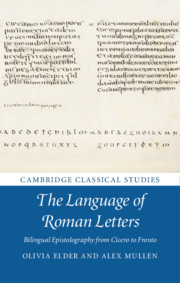Refine search
Actions for selected content:
60616 results in Classical studies (general)
Chapter 2 - A Roman Conversation? Code-Switching in Diachronic Context
-
- Book:
- The Language of Roman Letters
- Published online:
- 26 September 2019
- Print publication:
- 03 October 2019, pp 40-110
-
- Chapter
- Export citation
Chapter 4 - Imperial Relations: Greek and the lingua Romana of Fronto and Friends
-
- Book:
- The Language of Roman Letters
- Published online:
- 26 September 2019
- Print publication:
- 03 October 2019, pp 175-219
-
- Chapter
- Export citation
Acknowledgements
-
- Book:
- The Language of Roman Letters
- Published online:
- 26 September 2019
- Print publication:
- 03 October 2019, pp xi-xii
-
- Chapter
- Export citation
Chapter 3 - Republic of Letters: The Politics of Cicero’s Epistolary Code-Switching
-
- Book:
- The Language of Roman Letters
- Published online:
- 26 September 2019
- Print publication:
- 03 October 2019, pp 111-174
-
- Chapter
- Export citation
Bibliography
-
- Book:
- The Language of Roman Letters
- Published online:
- 26 September 2019
- Print publication:
- 03 October 2019, pp 309-324
-
- Chapter
- Export citation
Copyright page
-
- Book:
- The Language of Roman Letters
- Published online:
- 26 September 2019
- Print publication:
- 03 October 2019, pp iv-iv
-
- Chapter
- Export citation
Contents
-
- Book:
- The Language of Roman Letters
- Published online:
- 26 September 2019
- Print publication:
- 03 October 2019, pp vii-vii
-
- Chapter
- Export citation
Chapter 5 - The Language of Letters and Beyond: Greek in Suetonius’ Biographies
-
- Book:
- The Language of Roman Letters
- Published online:
- 26 September 2019
- Print publication:
- 03 October 2019, pp 220-270
-
- Chapter
- Export citation
Dedication
-
- Book:
- The Language of Roman Letters
- Published online:
- 26 September 2019
- Print publication:
- 03 October 2019, pp v-vi
-
- Chapter
- Export citation
Chapter 6 - Weaving together the Threads: Epistolary Connections
-
- Book:
- The Language of Roman Letters
- Published online:
- 26 September 2019
- Print publication:
- 03 October 2019, pp 271-290
-
- Chapter
- Export citation
Chapter 1 - Language and Life in Letters
-
- Book:
- The Language of Roman Letters
- Published online:
- 26 September 2019
- Print publication:
- 03 October 2019, pp 1-39
-
- Chapter
- Export citation
Index
-
- Book:
- The Language of Roman Letters
- Published online:
- 26 September 2019
- Print publication:
- 03 October 2019, pp 325-334
-
- Chapter
- Export citation
Appendix: Functions of the Code-Switches
-
- Book:
- The Language of Roman Letters
- Published online:
- 26 September 2019
- Print publication:
- 03 October 2019, pp 291-308
-
- Chapter
- Export citation
Tables
-
- Book:
- The Language of Roman Letters
- Published online:
- 26 September 2019
- Print publication:
- 03 October 2019, pp viii-x
-
- Chapter
- Export citation
Abbreviations
-
- Book:
- The Language of Roman Letters
- Published online:
- 26 September 2019
- Print publication:
- 03 October 2019, pp xiii-xiv
-
- Chapter
- Export citation

The Language of Roman Letters
- Bilingual Epistolography from Cicero to Fronto
-
- Published online:
- 26 September 2019
- Print publication:
- 03 October 2019
THE ETRUSCAN CITY OF VEII - (J.) Tabolli, (O.) Cerasuolo (edd.) Veii. Pp. xlii + 238, b/w & colour ills, b/w & colour maps. Austin: University of Texas Press, 2019. Cased, US$55. ISBN: 978-1-4773-1725-9.
-
- Journal:
- The Classical Review / Volume 70 / Issue 1 / April 2020
- Published online by Cambridge University Press:
- 20 September 2019, pp. 210-212
- Print publication:
- April 2020
-
- Article
- Export citation
URBANISATION IN ROMAN SICILY - (L.) Pfuntner Urbanism and Empire in Roman Sicily. Pp. x + 306, ills, maps. Austin: University of Texas Press, 2019. Cased, US$55. ISBN: 978-1-4773-1722-8.
-
- Journal:
- The Classical Review / Volume 70 / Issue 1 / April 2020
- Published online by Cambridge University Press:
- 19 September 2019, pp. 219-221
- Print publication:
- April 2020
-
- Article
- Export citation
TACITUS AND RELIGION - (K.E.) Shannon-Henderson Religion and Memory in Tacitus' Annals. Pp. x + 414. Oxford: Oxford University Press, 2019. Cased, £90, US$119.95. ISBN: 978-0-19-883276-8.
-
- Journal:
- The Classical Review / Volume 70 / Issue 1 / April 2020
- Published online by Cambridge University Press:
- 19 September 2019, pp. 128-130
- Print publication:
- April 2020
-
- Article
- Export citation
A COMMENTARY ON EURIPIDES’ TROADES - (D.) Kovacs Euripides: Troades. Pp. xiv + 370. Oxford: Oxford University Press, 2018. Cased, £90, US$124.95. ISBN: 978-0-19-929615-6.
-
- Journal:
- The Classical Review / Volume 70 / Issue 1 / April 2020
- Published online by Cambridge University Press:
- 19 September 2019, pp. 32-34
- Print publication:
- April 2020
-
- Article
- Export citation
